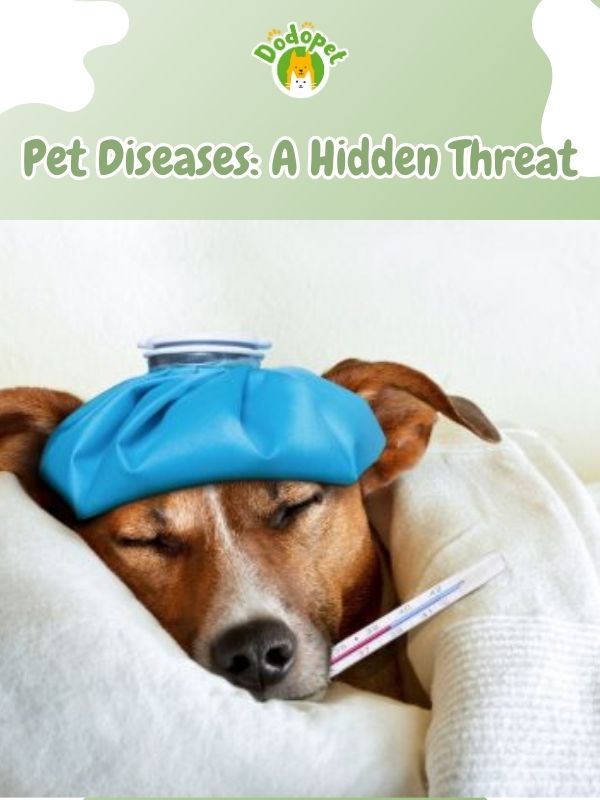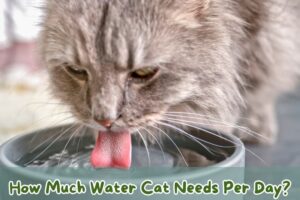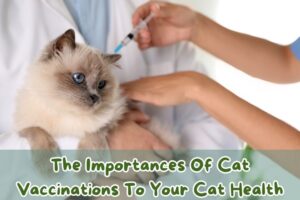Pet diseases can be a silent but deadly threat to our furry friends. While some conditions are easily recognizable, others may go unnoticed until it’s too late. It is crucial for pet owners to be aware of these hidden dangers and take preventive measures to ensure the well-being of their beloved companions.
Regular veterinary check-ups are essential in detecting and preventing pet diseases. These routine visits allow veterinarians to assess your pet’s overall health and catch any potential issues early on. By staying proactive, you can help safeguard your pet from silent but deadly conditions.
Heartworm Disease: A Silent Intruder
Heartworm disease is a common yet often overlooked condition that affects both dogs and cats. Caused by parasitic worms transmitted through mosquito bites, heartworms can silently invade your pet’s heart and lungs, leading to severe health complications if left untreated. Prevention is key when it comes to heartworm disease. Administering monthly preventive medications prescribed by your veterinarian can effectively protect your pet from this silent intruder. Signs of heartworm disease may include coughing, difficulty breathing, fatigue, and weight loss. If you notice any of these symptoms, seek immediate veterinary care.
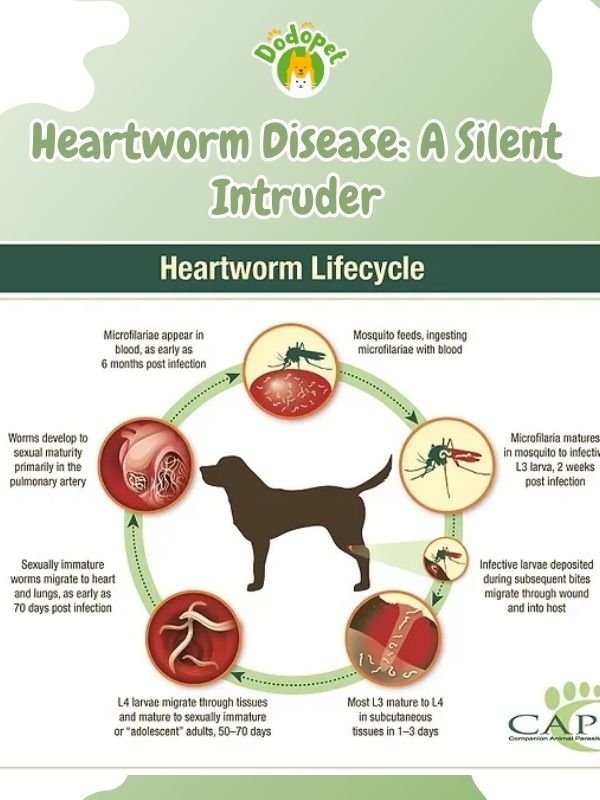
Heartworm Disease_ A Silent Intruder
Preventive measures of heartworm pet diseases
Preventive measures are crucial to protect your pets from various diseases, parasites, and health problems. Here are some essential preventive measures to ensure the health and well-being of your pets:
- Regular Veterinary Care: Schedule regular check-ups with your veterinarian. Annual or bi-annual wellness exams can help detect and address health issues early.
- Vaccinations: Ensure your pets are up to date on their vaccinations as recommended by your veterinarian. Vaccinations protect them from various contagious diseases.
- Parasite Control: Administer preventive medications for fleas, ticks, heartworms, and intestinal parasites as prescribed by your veterinarian. Regular parasite control is essential for your pet’s health.
- Safe Environment: Ensure your home and outdoor space are safe for your pets. Remove hazards, toxic plants, and chemicals from their reach.
Dental Disease: More Than Just Bad Breath
Dental disease is a silent but common condition that affects many pets. Poor oral hygiene can lead to plaque and tartar buildup, gum inflammation, tooth decay, and even systemic infections that can impact your pet’s overall health. Regular dental care is crucial in preventing dental disease. Brushing your pet’s teeth regularly, providing dental chews or toys, and scheduling professional dental cleanings can help maintain good oral health. Signs of dental disease may include bad breath, swollen or bleeding gums, difficulty eating, and loose or missing teeth. If you notice any of these symptoms, consult your veterinarian for a dental examination.
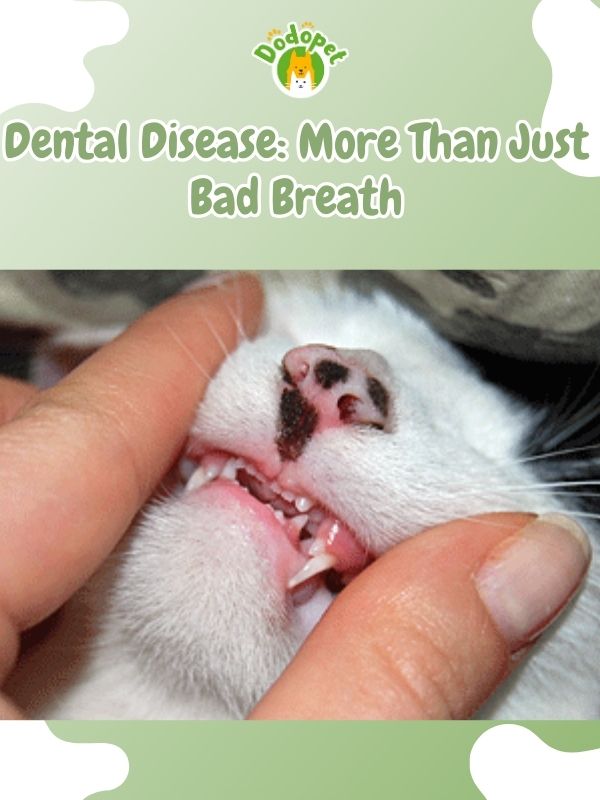
Dental Disease_ More Than Just Bad Breath
Preventive measures of dental pet diseases
Preventive measures for dental issues in pets are essential for maintaining their oral health. Dental problems can lead to pain, infection, and even systemic health issues. Here are some preventive measures for addressing dental issues in pets:
- Regular Dental Check-ups: Schedule regular dental check-ups with your veterinarian. They can assess your pet’s oral health and recommend appropriate actions.
- Dental Cleanings: Professional dental cleanings performed by your veterinarian are essential for pets. These cleanings can remove tartar and plaque buildup.
- Brushing: Brush your pet’s teeth regularly with a pet-specific toothbrush and toothpaste. Establish a routine early in your pet’s life. Aim for at least a few times a week.
- Dental Chews and Toys: Offer dental chews and toys designed to help keep your pet’s teeth clean. Look for products approved by veterinary associations, as not all are effective.
- Diet: Select pet foods that promote dental health. Some brands offer kibble with special textures that can help reduce plaque and tartar buildup.
- Monitor Your Pet’s Teeth: Regularly check your pet’s teeth and gums for signs of dental problems, such as bad breath, discolored teeth, or swollen gums. If you notice any issues, consult your veterinarian.
Kidney Disease: A Silent Decline
Kidney disease is a silent but progressive condition that can affect pets of all ages. The kidneys play a vital role in filtering waste products from the blood, maintaining fluid balance, and producing hormones. When kidney function declines, toxins build up in the body, leading to serious health complications. Early detection is crucial in managing kidney disease.
Regular blood and urine tests can help identify any abnormalities and allow for early intervention. Additionally, providing a balanced diet and ensuring proper hydration can support kidney health. Signs of kidney disease may include increased thirst and urination, loss of appetite, weight loss, and lethargy. If you notice any of these symptoms, consult your veterinarian for further evaluation.
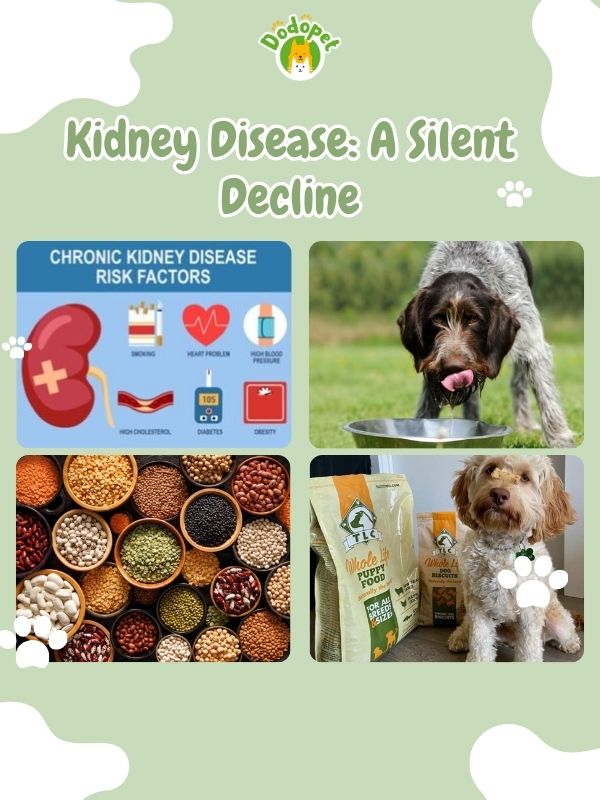
Kidney Disease_ A Silent Decline
Preventive measures of kidney pet diseases
Preventing kidney disease in pets is crucial for their long-term health and well-being. Kidney disease can be challenging to detect in its early stages, but there are several preventive measures you can take to reduce the risk and support your pet’s kidney health:
- Hydration: Ensure your pet has access to clean, fresh water at all times. Adequate hydration is essential for kidney health.
- Balanced Diet: Feed your pet a well-balanced, high-quality diet that is appropriate for their age, breed, and size. Consult your veterinarian for dietary recommendations.
- Limited Sodium Intake: Excessive sodium (salt) intake can strain the kidneys. Avoid feeding your pet foods high in salt, and be cautious with salty treats.
- Regular Exercise: Regular physical activity helps maintain overall health and can support proper circulation, which benefits the kidneys.
- Weight Management: Maintain your pet at a healthy weight. Obesity can increase the risk of kidney disease and other health problems.
- Avoid Overuse of Non-Steroidal Anti-Inflammatory Drugs (NSAIDs): Limit the use of NSAIDs to those prescribed by your veterinarian, as overuse can harm the kidneys.
- Kidney-Friendly Supplements: Some supplements, such as omega-3 fatty acids, may support kidney health. Consult your veterinarian before adding any supplements to your pet’s diet.
Diabetes Pet Diseases: A Sweet but Silent Enemy
Diabetes is a silent but increasingly common condition in pets. It occurs when the body fails to produce enough insulin or properly utilize it, resulting in high blood sugar levels. Left untreated, diabetes can lead to serious complications and even life-threatening emergencies.
Early detection and proper management are crucial in controlling diabetes. Regular veterinary check-ups, blood glucose monitoring, and insulin therapy (if necessary) can help keep your pet’s diabetes under control. Signs of diabetes may include increased thirst and urination, weight loss, increased appetite, and lethargy. If you notice any of these symptoms, seek veterinary care promptly.
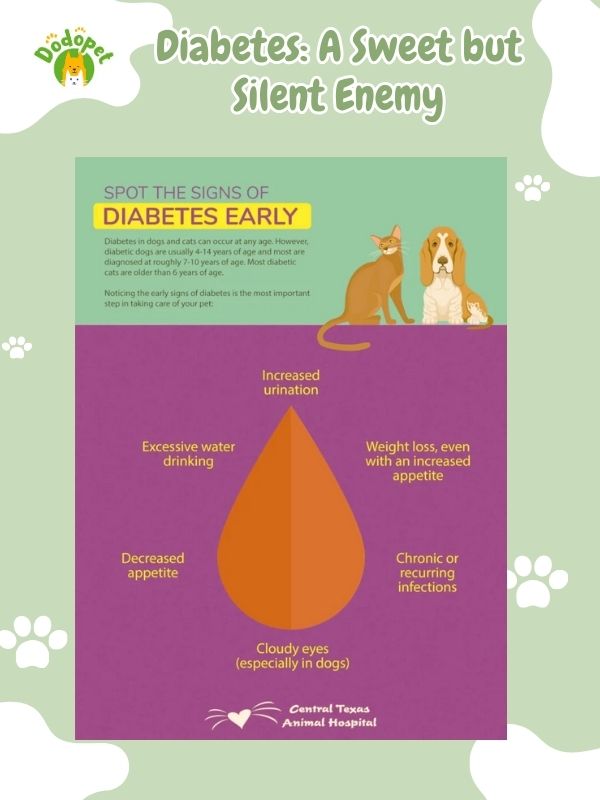
Diabetes_ A Sweet but Silent Enemy
Preventive measures of diabetes pet diseases
Preventing diabetes in pets involves adopting healthy lifestyle practices that support weight management and overall well-being. Diabetes is a metabolic disorder that affects the body’s ability to regulate blood sugar levels. Here are some preventive measures for diabetes in pets:
- Balanced Diet: Feed your pet a balanced and appropriate diet that is suitable for their age, size, and activity level. Consult your veterinarian for dietary recommendations.
- Portion Control: Be mindful of portion sizes. Overfeeding can lead to weight gain, which is a significant risk factor for diabetes.
- Regular Exercise: Engage your pet in regular physical activity. Exercise helps with weight management, maintains healthy metabolism, and reduces the risk of obesity.
- Weight Management: Maintain your pet at a healthy weight. Obesity is a major risk factor for diabetes. If your pet is overweight, work with your veterinarian to develop a weight loss plan.
- Avoid High-Sugar Treats: Limit the intake of high-sugar treats, as excessive sugar consumption can contribute to diabetes.
Cancer: A Silent Battle with Pet Diseases
Cancer is a silent but devastating disease that can affect pets of all ages. It can manifest in various forms, including tumors, leukemia, and lymphoma. Early detection and prompt treatment are crucial in improving the prognosis and quality of life for pets with cancer. Regular veterinary check-ups and screenings can help detect any suspicious lumps, bumps, or changes in your pet’s overall health.
Additionally, being aware of common cancer symptoms and risk factors can aid in early intervention. Signs of cancer may include unexplained weight loss, lumps or swelling, changes in appetite, difficulty breathing, and lethargy. If you notice any of these symptoms, consult your veterinarian for further evaluation.
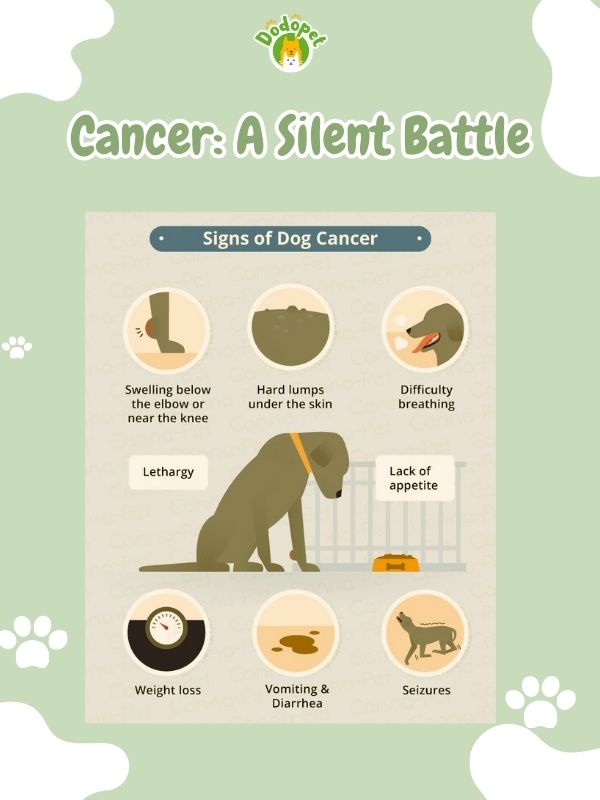
Cancer_ A Silent Battle
Preventive measures of cancer pet diseases
Preventing cancer in pets involves a combination of strategies aimed at reducing risk factors and maintaining overall health. While it’s not always possible to completely eliminate the risk of cancer, these preventive measures can help reduce the likelihood of your pet developing cancer:
- Regular Veterinary Check-ups: Schedule routine veterinary check-ups for your pet. Early detection and regular examinations can identify health issues, including lumps or changes in the body.
- Spaying and Neutering: Consider spaying or neutering your pet at the appropriate age. This can reduce the risk of certain reproductive cancers.
- Balanced Diet: Feed your pet a balanced, high-quality diet that supports overall health. Ensure the food is appropriate for their age, breed, and activity level.
- Portion Control: Measure and control your pet’s food portions to prevent obesity, which is a risk factor for certain cancers.
- Physical Activity: Engage your pet in regular exercise to maintain a healthy weight and promote overall well-being.
- Weight Management: Maintain your pet at a healthy weight. Obesity is associated with an increased risk of cancer.
- Limit Exposure to Toxins: Keep your pet away from toxic substances like chemicals, pesticides, and poisonous plants. Store chemicals and medications out of their reach.
- Parasite Control: Protect your pet from internal and external parasites with regular treatments. Some parasites, like heartworms, can contribute to health problems, including cancer.
- Limit Sun Exposure: Pets with light skin or fur may be at risk of skin cancer due to sun exposure. Keep them indoors during peak sun hours, use pet-safe sunblock, or provide shade when outdoors.
Conclusion
Pet diseases may be silent, but they are not invincible. By staying vigilant, providing regular veterinary care, and taking preventive measures, you can unmask these hidden threats and protect your beloved pets from these silent but deadly conditions.

